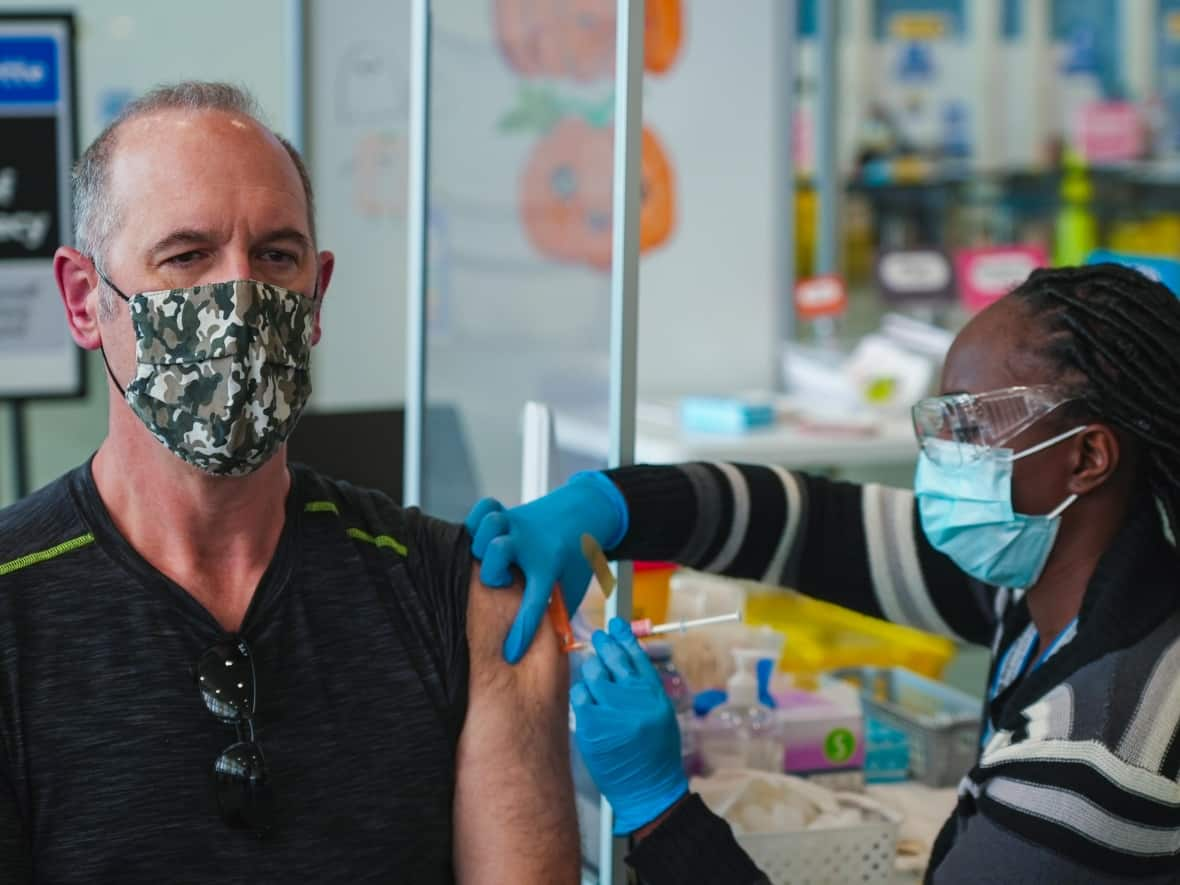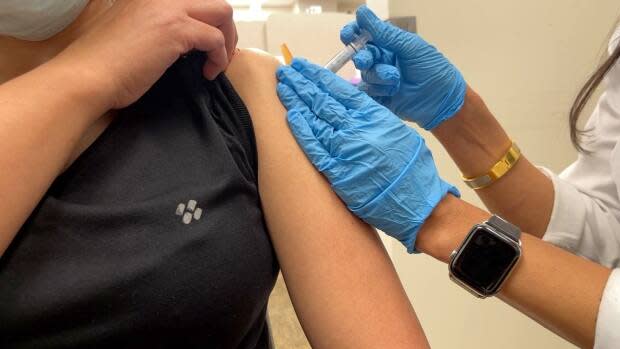What to know about getting a bivalent COVID-19 booster vaccine in Alberta

New COVID-19 bivalent booster vaccines may be leaving some Albertans with questions, but a local infectious diseases specialist says they shouldn't overthink.
Health Canada has approved two COVID bivalent vaccines that target multiple strains of the novel coronavirus: the original strain of SARS-CoV-2 and its Omicron BA.4 and BA.5 subvariants.
Bivalent boosters differ from previous COVID-19 immunizations, which only targeted the original strain of SARS-CoV-2.
"People are getting a little kind of hung up on details and it's making them feel more uncertain and negative than they really need to," said Dr. Lynora Saxinger, an infectious diseases specialist at the University of Alberta.
Shivali Sharma, a pharmacist in Edmonton, has been fielding lots of calls from people asking which bivalent vaccine they should get and when they should get it.
The bivalent boosters approved for use in Canada were made by Moderna and Pfizer-BioNTech.
The Moderna bivalent booster is readily available at most pharmacies right now, Sharma said.
The Pfizer-BioNTech bivalent vaccine should be available as of Oct. 24, according to Alberta Health's website.
There's no wrong choice between the two, Saxinger said, as research shows both are effective against current COVID-19 variants of concern.
Timing the vaccination
Properly timing when one gets their booster is what's important, Saxinger said.
As of Oct. 10, 77.8 per cent of all Albertans, including those who are ineligible, have received two doses of COVID-19 vaccine; 82.2 per cent have had at least one dose, provincial data shows.
For those people, Saxinger's advice is simple: get your next dose.

"The third dose does a lot of heavy lifting in terms of vaccine effectiveness, because all of the Omicron family is better at getting past the vaccine," she said.
Provincial data also shows 39.7 per cent of Albertans have received a third dose of vaccine, which is where it gets a bit trickier.
People who have their third dose and have not recently contracted COVID-19 should opt for a bivalent booster, Saxinger said.
But those with three doses who have recently had COVID-19 — as well as people who have received four doses — should wait before getting a bivalent vaccine, she said.
"If you boost while your immune system is already boosted, you lose some of the effectiveness of that dose," she said.
"It therefore makes more sense [to wait] until after that immune system response has aged and matured a little bit before you boost [again]."

Health Canada approved the Moderna bivalent booster for use in adults. The Pfizer-BioNTech bivalent vaccine was approved for people aged 12 or older.
Albertans must wait until at least five months have passed since their last dose, or most recent COVID-19 infection, before they can book to receive their bivalent dose, according to Alberta Health's eligibility guidelines.
A shortened period of three months can be considered for some people, however, such as those at higher risk of severe outcomes if they were to contract the illness.
Saxinger advises people get their booster within a three-to-six-month period, especially if someone is at high risk of serious illness, or if COVID-19 is spreading among a person's close contacts.
COVID, flu numbers expected to rise
Alberta public health officials identified 46 new COVID-19 deaths over the previous two reporting weeks, provincial data shows.
Data from the reporting week of Sept. 27 to Oct. 3 was part of the most recent week's update because Alberta Health experienced what Dr. Deena Hinshaw, Alberta's chief medical officer of health, called "a data flow problem" last week.
As of Oct. 10, there were 1,014 COVID-19 hospitalizations, including 31 intensive care unit patients. There were 980 Albertans in hospital, including 39 ICU patients, two weeks ago.
Alberta's seven-day PCR test-positivity rate for COVID-19 was 19.08 per cent, as of Oct. 10.
Public health officials have confirmed 2,746 new COVID-19 cases through PCR testing over the previous two reporting weeks.
There is likely more virus spreading in the community, however. Provincial eligibility rules make it so few Albertans can get a PCR test, and the data excludes positive rapid test results.
"We're starting to see numbers going up, but we're not right in the thick of it yet," Saxinger said.
Experts are also predicting a "rough flu season" this year, which may add to the burden on health care, she added.

Many public health restrictions aimed to stymie the spread of COVID-19, such as gathering limits and mask mandates, are lifted and this could lead to more people getting sick, she said.
"We are looking at the potential of having quite a rise in cases this fall [and] winter, in both COVID-19 and flu," said Sharma, the pharmacist in Edmonton.
Alberta Health has confirmed 40 influenza cases as of Oct. 1. There are 10 people in hospital, including two patients in ICU, according to Alberta's influenza dashboard.
The flu shot will be available in Alberta starting Monday.
Sharma and Saxinger say it's fine to get a flu shot and COVID booster at the same time.


